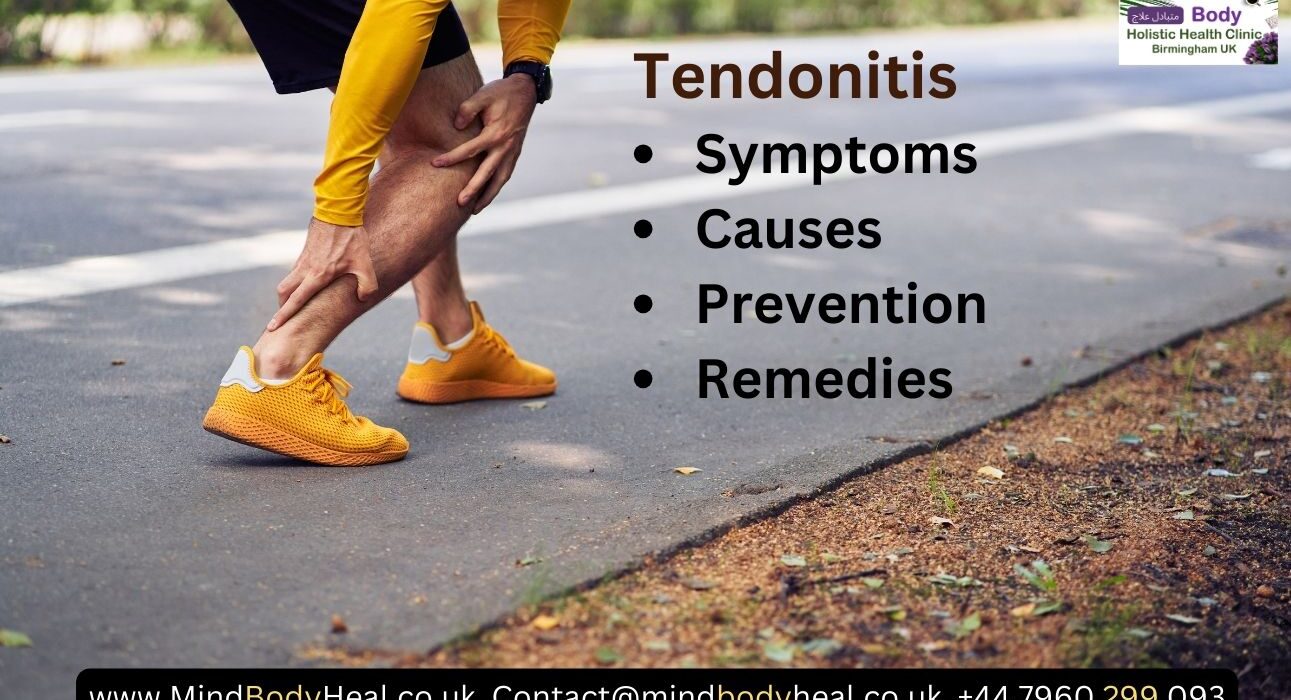Tendonitis / Tendinitis
A tendon is a flexible fibrous tissue – a cord of strong, like a rope. It connects your muscles to your bones and let us move our limbs.
Tendinitis is the inflammation of a tendon or its sheath.
Its pain occurs more frequently in cold weather and is most common around shoulders, elbows, wrists, forearm, thumb, knees, hip, lower calf and heels.
Most common Types of tendonitis are
- Achilles tendinitis – an overuse injury of the Achilles tendon, the band of tissue that connects calf muscles at the back of the lower leg to your heel bone.
- Golfer’s elbow – a condition that causes pain where the tendons of your forearm muscles attach to the bony bump on the inside of your elbow.
- Patellar tendinitis – can cause pain in the tendon below the kneecap.
- Tennis elbow – overusing the muscles attached to your elbow.
Most Common Signs and Symptoms of tendonitis may include
- Pain, often described as a dull ache, especially when moving the hurt limb or a joint
- Tenderness or stiffness
- Swelling
- Redness and
- Weakness of muscles
These symptoms may last for months or years.
Most common Risk factors & causes are
Overuse of a tendon a repetitive strain injury is the most common cause of tendonitis.
- Age – As people get older, tendons become less flexible — which makes them easier to injure.
- Gender – Achilles tendinitis occurs most commonly in men.
- Nature of Work – It is more common in people, such as gardeners, keyboard users and manual labourers, whose jobs involve:
Repeated motions
- Awkward positions or poor posture
- A lot of overhead reaching
- Vibrations
- Poor equipment
- And Forced movements.
- Obesity and tight calf muscles also can increase tendon strain.
- Running in worn-out shoes or hilly terrain can increase risk of Achilles tendinitis.
- Sudden increase in amount or difficulty of training
- Hard surfaces, such as concrete or gym floors
- Too little recovery time after an injury or too little time to get used to the activity again after time off
- Certain medical conditions such as diabetes, psoriasis, hypertension can increase the risk of tendinitis.
- Use of certain medications may increase the risk such as
Antibiotics known as fluoroquinolones, Corticosteroids such as cortisone, and Aromatase inhibitors etc, used to lower breast cancer risk
Suggested Supplements for tendonitis
The supplements glucosamine and chondroitin are widely used for the treatment of osteoarthritis.
They may work by enhancing the production of substances that keep cartilage healthy and flexible. On this basis, they have also been recommended for treating or preventing tendonitis.
Omega-3 Fatty Acids a powerful anti-inflammatory agent with many other health benefits.
It is best to get omega-3 from your diet, such as through fatty salmon and sardines.
Top Aromatherapy Essential Oils for tendonitis
- Eucalyptus has a cooling effect on muscles and reduces pain and inflammation.
- Chamomile oils can help with pain, inflammation, soothe muscle tension and reduce spasms.
- Rosemary and Yarrow are great for their ability to ease pain and inflammation.
A form of massage called deep transverse friction massage has shown some promise for tendonitis.
Top rated Home Remedy for tendonitis
Make sure to avoid any ingredient you are allergic or sensitive to – discussed in this article!
Home Remedy No 1
Turmeric & ginger have powerful anti-inflammatory properties. Adding them to your diet, cooking or taking their supplement may help reduce inflammation and pain associated with tendonitis.
People specially with diabetes and heart conditions should consult their doctor first.
Home Remedy No 2
The herb white willow bark contains a substance called salicin, appropriate doses of the herb might offer some symptomatic relief for tendonitis.
Top homeopathic Remedies for tendonitis
Make sure to consult a qualified homeopath for detailed consultation, right remedy & proper dosage etc.
- Arnica Montana – for general tendon injury
- Benzoic Acid – especially effective for pain in Achilles tendinitis
- Cimicifuga – for wrist pains
- Bryonia for tear in synovial membrane
- Rhus tox repairs a damaged tendon
- Ruta Frozen shoulder due to Tendon Strain.
- Ammonium Phos and Colocynth for short tendons
Prevention and additional tips
- Ease up. Avoid activities that place too much stress on your tendons, especially for long periods.
- Improve the way you move or do an activity.
- After exercise, move your joints through full range of motion, when your muscles are warmed up.
- Move right in the workplace. Make sure your chair, keyboard and desktop are positioned correctly for your height, arm length and the tasks you do.
For your particular health problem(s), or to change your medications it is strongly suggested to avoid self-medication and consult your GP / health provider or Mind & Body Holistic Health Clinic.
If you are interested in such health-related informative content, please make sure to follow our YouTube channel.






